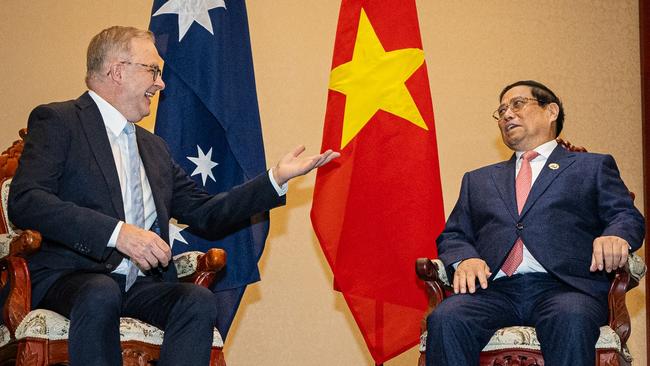What’s the deal? China ‘will want trade-off on lobsters’
Canberra and Beijing are likely to engage in a ‘quid pro quo dance’ in coming weeks following Beijing’s announcement that it will lift its ban on Australian lobsters, experts say.

Canberra and Beijing are likely to engage in a “quid pro quo dance” in coming weeks following Beijing’s announcement that it will lift its ban on Australian lobsters, experts say, with Anthony Albanese refusing to confirm whether China’s long-fought bid to join a trans-Pacific free-trade pact was raised in his meeting with Premier Qiang Li in Laos this week.
The Prime Minister said he did not engage in a “transactional” way with partners when asked what Beijing would expect from Australia following the rolling back of the lobster ban, due to take place by the end of the year.
Mr Albanese also failed to back Japan’s proposal for an “Asian-NATO” security bloc to counter China’s influence in the region, stating Australia had its “own arrangements” in place, including the Quad.
Mr Li’s announcement on Thursday that China would roll back the last of its major trade restrictions as part of a four-year economic coercion campaign came as new figures showed Australia exported more than $15bn of previously impeded products to China – including coal, cotton, timber logs, barley and wine – between September 2023 and August 2024, compared to $6.2bn the previous year. More than $1.3bn of that was exported in August, the figures released by the government on Friday revealed.
While Beijing confirmed it would lift trade restrictions on the Australian lobster market by the end of the year, Foreign Minister Penny Wong said she hoped it would be sooner than that.
“We’re hoping (it will be) a little earlier than that,” Senator Wong said. “When we came to government we inherited some $20bn worth of trade impediments … now less than $500m of those impediments (on beef) remain. We will continue … to press for those trade impediments to be removed.”
However, Australian National University research fellow Benjamin Herscovitch said it would be “critically important” to understand what China expected in return for easing the restrictions on the lobster market, which was worth more than $750m in 2019 before the ban was put in place.
“It’s unclear what the quid pro quo pro, if any, has been, but we know from past experience with removal of trade restrictions that China has sought to portray the removal of restrictions as a mutual agreement with concessions from Australia,” he said.
“We’ll definitely be seeing a sort of quid pro dance between China and Canberra in coming months … maybe in the discontinuation of some of our anti-dumping measures on Chinese exports … (or) the tick off of some Chinese foreign investment into renewables projects.”
Dr Herscovitch said there was “the possibility Beijing will be pushing for more from Canberra until live lobster is brought online again”, pointing to the fact that statements from Beijing officials and news stories from Chinese media barely made mention of the removal of the lobster ban.
On top of Labor’s anti-dumping restrictions on some Chinese products and its caution in allowing investment by Beijing in energy projects, Australia’s position on China’s entry to the Comprehensive and Progressive Agreement for Trans-Pacific Partnership was likely also raised by Mr Li in Thursday’s bilateral meeting, Lowy Institute senior fellow for East Asia Richard McGregor said.
“The way (China) has drawn this out means there’s now …. an immense relief and political win the (Australian) government can bring home with it, but there’s a sense Australia now has to reward China lifting trade restrictions,” Dr McGregor said. “China certainly wants to join CPTPP, they’ve made it very clear.”
China’s bid to join the trade partnership has met with strong opposition by Japan, the US and Australia, which will be chairing the CPTPP from next year.
Dr McGregor said it would be “remarkable” for countries like Australia to change their view on China’s membership, regardless of the rolling back of trade restrictions. But he said Australia should be open to ticking off Chinese renewable energy and critical minerals projects, which China could take as a win following its lifting of the lobster ban.
Mr Albanese said he did not “engage in a transactional way” with partners and would not confirm whether Beijing’s desire to join the CPTPP was raised in his meeting with Mr Li.
“You know what China gets out of getting our live lobsters? Our live lobsters,” he said.
Strategic Analyst Australia director Michael Shoebridge said Mr Albanese knew Beijing “sure as hell” viewed the relationship with Australia as a transactional one and would be expecting something in return.
“His comments are a denial of the way China operates or just wilful blindness,” he said.
“(Mr Albanese) has entered a transactional relationship with Beijing.”




To join the conversation, please log in. Don't have an account? Register
Join the conversation, you are commenting as Logout